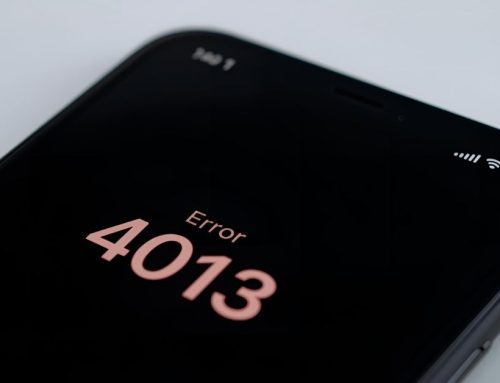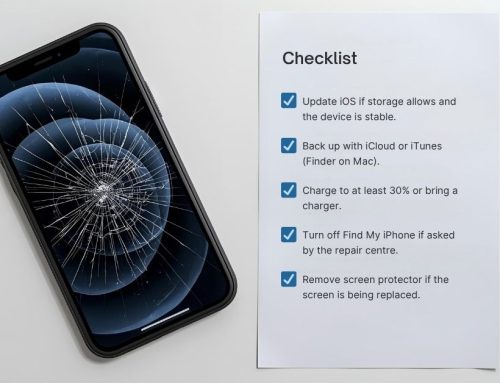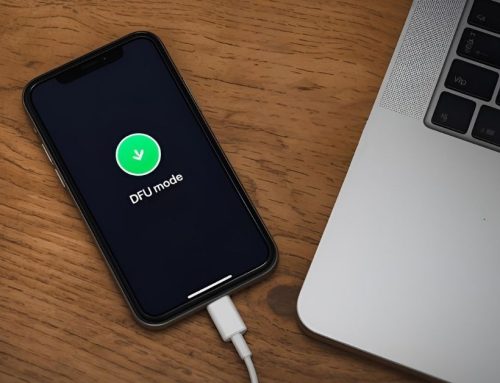If you need to fix iPhone iOS update issues, you’re not alone—many users face errors like failed downloads, devices stuck on the Apple logo, or sudden battery drain after installing a new version. The good news is that most of these problems can be resolved quickly with the right troubleshooting steps. Start by checking compatibility, freeing up storage, and ensuring your device has enough battery power. If updates still fail, advanced methods such as resetting network settings, using Recovery Mode, or even DFU Mode can restore smooth performance. With these proven solutions, you can fix iPhone iOS update issues and keep your device secure and reliable.
Quick checks before an iOS update
Before you update your iPhone, verify it’s compatible with the latest iOS by checking Apple’s supported models list. Make sure your device has enough storage space and at least 50% battery to avoid mid-update interruptions. Don’t forget to back up your iPhone or iPad to safeguard your data in case anything goes wrong.

Check iPhone compatibility and storage
Wondering if your iPhone is ready for the latest iOS update? Start by checking compatibility and storage. Navigate to Settings > General > About to see your model and verify it’s on Apple’s compatibility list. Make certain you have at least 1GB of free storage. Regularly clear space by:
- Deleting unused apps
- Removing large files
- Using iTunes for updates
Stay prepared and master every update.
Check network and battery
When preparing for an iOS update, two quick checks can make all the difference: network stability and battery level. First, verify your internet connection is strong; a reliable Wi-Fi network is essential. You can check for updates only if your connection’s stable. Next, confirm your battery’s above 50% and keep the device plugged in to prevent interruptions during the update.
Back up your iPhone or iPad
After guaranteeing your network and battery are ready for the update, it’s important to protect your data by backing up your iPhone or iPad. This step prevents data loss during the update. Use these methods:
- iCloud: Go to Settings > [your name] > iCloud > iCloud Backup and tap “Back Up Now.”
- iTunes/Finder: Connect to your computer and click “Back Up Now.”
- Guarantee sufficient storage space.
Fix problems after an iOS update
After updating your iPhone, you might notice battery drain, app crashes, or Bluetooth issues disrupting your day. To tackle these, start by checking for app updates and ensuring your Bluetooth settings are in order. If your iPhone won’t turn on post-update, a force restart or connecting it to iTunes for a recovery might be necessary.
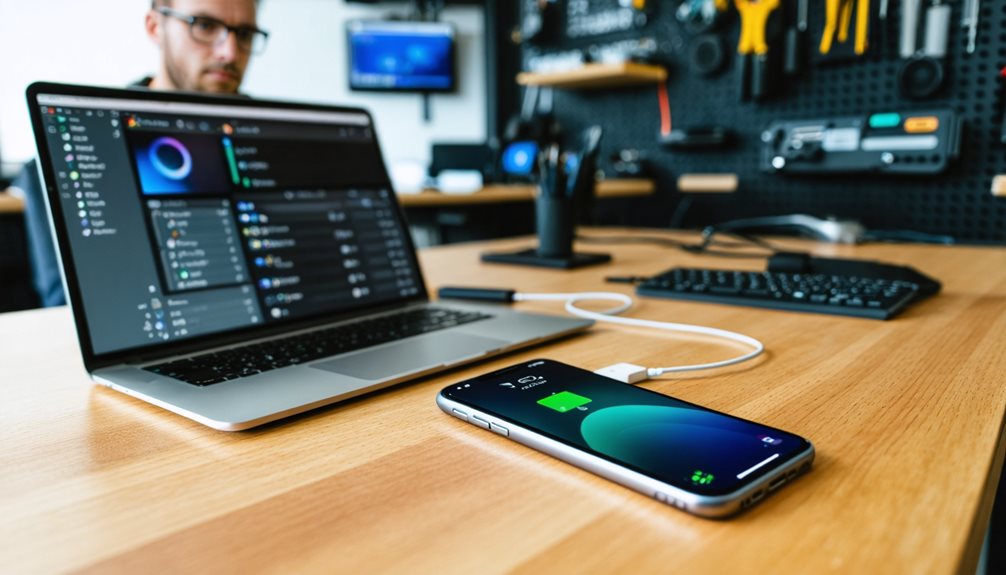
Battery drain after iOS update
Experiencing battery drain after an iOS update can be frustrating, but don’t worry—there are steps you can take to address the issue. Start by managing background processes that may cause battery drain:
- Check app usage: Go to Settings > Battery to identify power-hungry apps.
- Adjust settings: Limit Location Services and Background App Refresh.
- Hard reset: Hold Power and Home buttons to clear temporary glitches.
App crashes or Bluetooth issues after update
Moving from battery concerns, you might face app crashes or Bluetooth issues after updating your iPhone. To resolve app crashes, force quit the problematic app, update it, or reinstall if necessary. For Bluetooth issues, resetting network settings often helps. Toggling Bluetooth off and on or re-pairing devices can also restore functionality. If problems persist, consider restoring your device through iTunes or Finder.
If the iPhone will not turn on after update
When your iPhone won’t turn on after an iOS update, it can be quite frustrating, but there are several steps you can take to troubleshoot the issue.
- Perform a hard reset by holding the Power and Volume Down buttons until the Apple logo appears.
- Charge your device for at least 15 minutes.
- Resolve a boot loop by restoring it in Recovery Mode using iTunes or Finder.
Which version of iOS should iPhone users install
Before you update your iPhone, check your current iOS version by directing to Settings > General > About. Keeping your device updated to the latest iOS, like 18.6.2, not only reveals new features but also strengthens security with essential patches. These updates address vulnerabilities, ensuring your data remains protected against emerging threats.
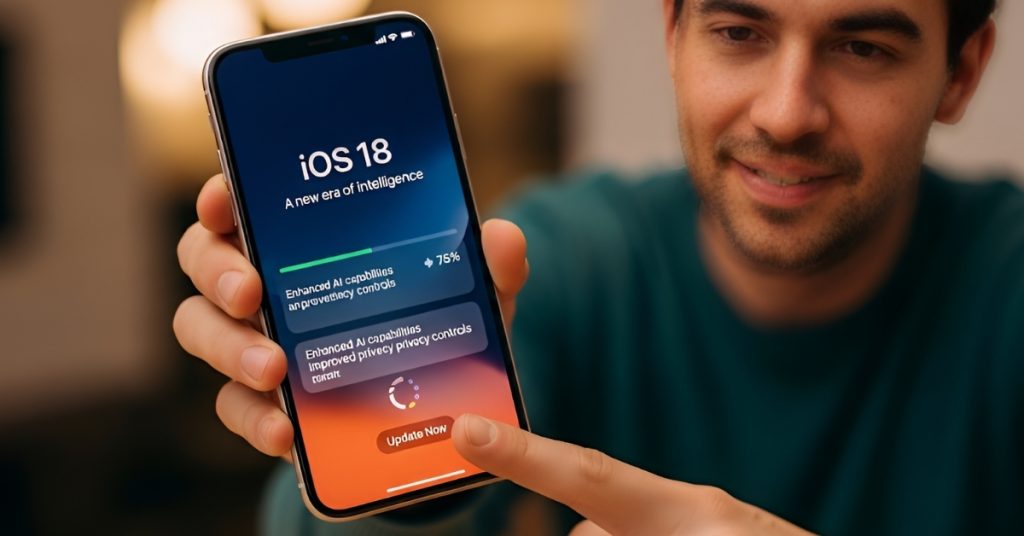
How to check your iOS version
- Compare your iPhone model with Apple’s compatibility list.
- If you’re behind, update to iOS 18 for best performance.
- Regularly check Settings > General > Software Update for the latest features and improvements.
Why updating to the latest iOS helps security
Checking your iOS version assures your iPhone is running smoothly and securely, especially with the latest iOS 18 update. Updating to the latest iOS enhances security by patching vulnerabilities and bolstering features like Face ID and data encryption. These iOS updates guarantee your device is protected against emerging cyber threats. Stay ahead by installing the newest version to maintain robust security and compatibility with cutting-edge apps.
Security patches fixed in iOS 18.6.2
In iOS 18.6.2, several critical security patches have been implemented, making it essential for you to update your iPhone to this version. By upgrading to the latest iOS, you’ll safeguard your device with:
- Enhanced protection against vulnerabilities and malware threats.
- Improved privacy features ensuring your data remains secure.
- Resolved bugs leading to smoother performance.
Don’t compromise your device’s security—update now!
iOS 18 update notes and changes
You’re probably excited to explore what’s new in iOS 18, including its enhanced privacy features and redesigned Control Centre. Alongside iOS 18, Apple has rolled out updates for iPadOS, ensuring a seamless experience across your devices. Keep an eye on the changes brought by iOS 18.6 and 18.6.2, which further refine performance and fix any lingering issues.
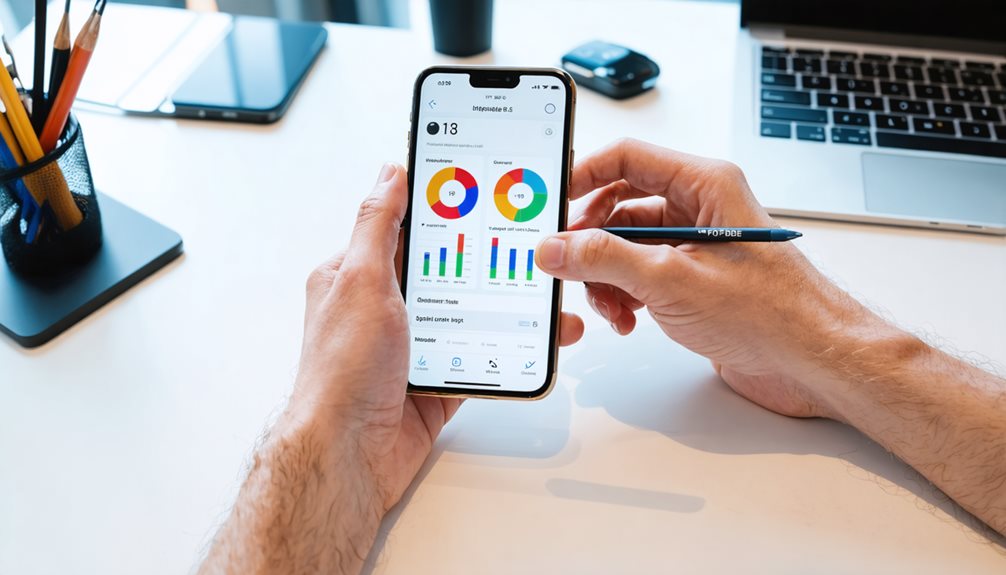
What is new in iOS 18
You’ll find plenty to explore in iOS 18, with a host of new features designed to enhance your iPhone experience. The latest version of iOS introduces a new update that delivers:
- Enhanced customisation for the Lock Screen with widgets and font options.
- Improved privacy tools for better data management.
- A redesigned Control Centre for streamlined access to settings.
Master these features for a truly personalised iPhone.
Updates issued alongside iOS 18 for iPadOS
As you explore iOS 18’s new features on your iPhone, it’s also worth noting the updates issued for iPadOS with the release of iOS 18. This update enhances multitasking, allowing seamless app use side by side. The revamped Control Centre offers quicker access to settings, while Apple Pencil improvements and Safari’s boosted privacy restore your iPad’s functionality to new heights. Update now to experience unparalleled efficiency.
What changed in iOS 18.6 and iOS 18.6.2
Though updates can sometimes be challenging, iOS 18.6 and iOS 18.6.2 bring essential enhancements that improve your iPhone’s performance and security. You’ll experience:
- Performance improvements: Enhanced stability and fluid system navigation.
- Security features: Addressed vulnerabilities for better protection.
- Battery optimisation: Improved battery life during regular use.
These updates guarantee a more seamless interaction with your device, boosting compatibility with third-party apps.
Version specific fixes
When you encounter issues with specific iOS versions like 18.4 or 18.4.1, there are targeted solutions you can try. For problems with iOS 18.5, 18.6, or 18.6.1, common fixes include checking your storage and network settings. If you’re still facing trouble with iOS 18.6.2, a hard reset or Recovery Mode may be necessary to restore functionality.
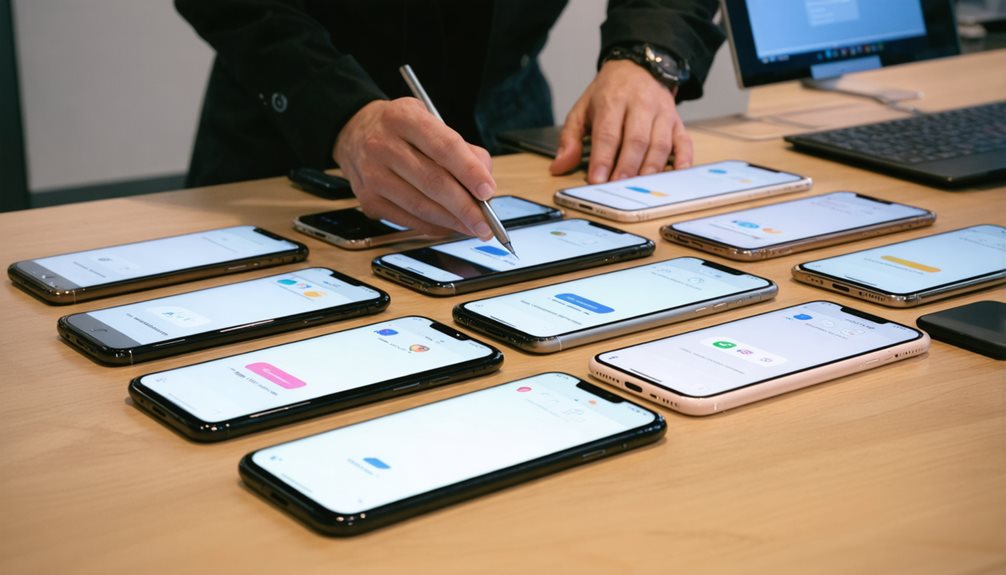
Fix iOS 18.4 update problems
Many iPhone users face challenges with the iOS 18.4 update, but there are specific steps you can take to tackle these issues. If you’re unable to update or encounter the ‘software update failed’ error, consider these actions:
- Remove the update and re-download it.
- Update via iTunes or Finder for a more stable connexion.
- Verify your device is compatible with iOS 18.4.
Fix iOS 18.4.1 update problems
If you’re dealing with issues from the iOS 18.4.1 update, specific strategies can help. Make sure your iOS device has enough storage and a stable network connection before attempting any software update and download. Restart your device if you see “Software Update Failed.” For persistent boot loops, use a hard reset or restore via recovery mode. Face ID problems and battery drain may require settings checks.
Fix iOS 18.5 update problems
Following the challenges of the iOS 18.4.1 update, users now face new issues with iOS 18.5 that require attention. To address these:
- Force restart your device if it’s freezing on the “Installing” screen.
- Verify a stable Wi-Fi connection to prevent “Software Update Failed” errors.
- If stuck in a boot loop, enter Recovery Mode and restore via iTunes or Finder.
Fix iOS 18.6 and iOS 18.6.1 update problems
When updating to iOS 18.6 or 18.6.1, you might encounter a few snags, but don’t worry—these can often be resolved with some straightforward steps. Make sure you’ve got at least 1 GB of free storage for the software update. If you face a “Software Update Failed” message, try deleting the pending update in Settings and re-download it. A stable Wi-Fi connection is essential.
Fix iOS 18.6.2 update problems
Although updating to iOS 18.6.2 should generally enhance your device’s performance, some users might face specific problems. To fix the issue, consider:
- Ensuring at least 1 GB of free space before updating using a stable Wi-Fi connection.
- Performing a hard reset if your device gets stuck on the update screen.
- Addressing activation errors by reactivating through iTunes or Finder for stability.
Prepare for iOS 26 when it arrives
As you prepare for the arrival of iOS 26, it’s crucial to guarantee your iPhone is ready for a smooth update process. First, confirm your model is on Apple’s list of compatible devices. Free up at least 1 GB of storage, and maintain a stable Wi-Fi connection. Charge your battery to at least 50%, and back up your data using iCloud or iTunes/Finder to avoid issues.
When to contact Apple Support

If you’ve tried all troubleshooting steps and still face persistent issues after an iOS update, it’s time to contact Apple Support. They can help with error codes, boot loops, or activation problems that don’t resolve through Recovery Mode. When these issues persist, booking a repair might be necessary to get your device back on track.
Contact Apple Support for persistent issues
When standard troubleshooting steps don’t resolve your iPhone’s update issues, it’s time to contact Apple Support. They can expertly handle:
- Persistent errors: If you see repeated error messages or device freezing during updates.
- Stuck devices: Assistance when your iPhone is in a boot loop or recovery mode.
- Activation troubles: Help with network or SIM issues hindering activation post-update.
Contact Apple to guarantee your device functions seamlessly.
Book a repair if Recovery Mode does not work
After reaching out to Apple Support for persistent update issues, there might be instances where your iPhone remains unresponsive, even after trying Recovery Mode. At this point, it’s crucial to book a repair. A deep hardware or software problem could exist. Schedule an appointment via Apple’s website or the Support app. Verify your device’s warranty status is checked to potentially cover repair costs.
Final Thoughts
In conclusion, if you’re facing issues after updating to iOS 18, don’t stress. Start with the basics: check network stability and storage. Restarting or resetting network settings often resolves common problems. For more serious issues, try a hard reset or Recovery Mode. Remember, keeping your device updated guarantees access to the latest features and security. If problems persist, don’t hesitate to contact Apple Support for expert assistance. Embrace iOS 18 and enjoy its new features!



